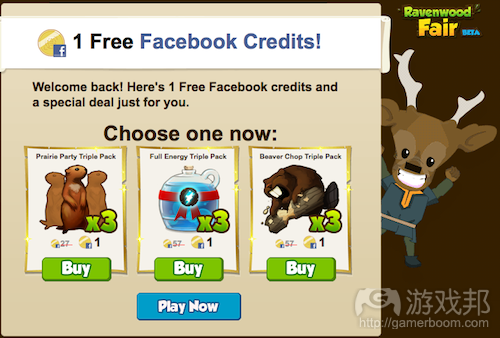中型开发商对Facebook Credits新政态度不一
作者:AJ Glasser
距离7月1日Facebook要求开发商将Facebook Credits与游戏绑定的最后期限还有40天,多数中型开发商都采纳了这种新规则,将Credits整合为购买某些额外道具的方式。
中型开发商指游戏累积月活跃用户在300万至1000万范围内的开发商,包括RockYou、Cie Games、Funzio、Kabam、LOLapps和许多所制作的游戏时常出现在Facebook社交游戏排行版上的开发商。
尽管这些开发商中只有少数在2010年整合声明发表后采纳Facebook Credits,近几个月来许多开发商逐渐追上这种趋势,将其添加到现有付费方法中。许多人成功引进Credits只有三个多月的时间,他们将其作为购买游戏内某些特别道具的方法,或获得游戏中额外虚拟货币的唯一方式。
据称,开发商整合行动缓慢的原因之一在于软件开发工具包(游戏邦注:某些Facebook Credit功能的实现需要利用工具包)的问题。多数中型开发商仍然使用旧版SDK运营社交游戏,为整合Credits功能,他们必须升级至新版SDK。有些开发商表示,升级后游戏出现问题,这让某些开发商延缓或停止整合Facebook Credits功能。
因为这些开发商有庞大的用户群,许多人很可能觉得经不起在最后期限前整合Credits所导致的技术性问题带来的风险。只有那些用户较新或还未在游戏中实现盈利的开发商以Frictionless Credits等形式深度整合Credits系统。有些开发商还采用其他特别功能将Credits作为购买特殊道具或货币的唯一方式。在大型开发商中,CrowdStar和Wooga便采用了上述做法。
近期,有些技术问题可能已经得到妥善处理。一位不愿意透露姓名的开发者表示,Facebook正努力解决性能问题来向那些使用旧版SDK的开发商推行Credits。但此开发者也不能确信这类问题已完全得到解决。
尽管这些技术难题究竟有多严重仍不得而知,但开发商不愿意向Facebook贡献30%的盈利分成是确定无疑的事,这也是新规则进展缓慢的症结所在。
无论出于何种原因,Facebook正忙于应对此类问题。某位Facebook发言人表示:“我们正同那些将Facebook Credits整合至游戏中的开发商密切合作,处理开发商可能面临的任何问题。”
Facebook好似也在进一步帮助开发商将Credits引进现有大量用户的游戏中。比如,将近两周前,《Ravenwood Fair》向玩家发送一份通知,称游戏免费奖励一个Facebook Credit。玩家点击那条通知会马上进入游戏中的“打折”页面,催促他们用这个免费的Credit购买三款价格打折至1个Credit的道具之一。玩家也可以点击“Play Now”按键,不花费Credit直接跳过这个打折页面。玩家退出《Ravenwood Fair》后,Credit不会被收回。
Facebook或《Ravenwood Fair》开发商LOLapps都未曾就这个免费Credit情况发表声明,但这确实是个开发商可用于测试用户反应的特殊方法。这也可以成为开发商培养用户使用Credits习惯的工具,因为许多玩家要么根本不知道货币即将发生改变,要么不确定Credits将如何融入他们的游戏体验中。
尽管可以通过这些方法逐步整合Facebook Credits,现在某些中型开发商依然持观望态度,比如《Kingdoms of Camelot》的开发商Kabam。其最新游戏《Global Warfare》并未将Facebook Credits整合成游戏虚拟货币的购买方式。该公司MAU最大的游戏《Dragons of Atlantis》也完全未采用Facebook Credits,只在游戏用户支持文件中说明这将是玩家未来的支付方式之一。就游戏中不使用Credits这个问题,Kabam总经理Bryan Bennett表示公司将遵从整合指导意见,在7月1日最后期限前开通此功能。
Canaan Partners的成员包括Inside Network的Justin Smith、Credits产品经理Deborah Liu、Kabam副总裁Sheridan Hitchens和TapJoy首席执行官Mihir Shah。就Credits及支付方式问题,上周Liu表示Facebook平台上使用Facebook Credits的虚拟货币交易已超过80%。
随着7月1日逐渐临近,中型开发商的Credits整合行为渐受关注。对开发商而言,事情在短期内能否平缓进展仍未可知。当然,Facebook会直接或通过开发商论坛向那些有特别顾虑的开发商伸出橄榄枝。(本文为游戏邦/gamerboom.com编译,如需转载请联系:游戏邦)
The Road to Credits: Mid-Market Developers Experience Technical Difficulties, Experiment With New Promotions
AJ Glasser
Social game developers have 40 more days of life on the Facebook Platform until new rules requiring the exclusive use of Facebook Credits go into effect. With the exception of the larger developers we explored recently, mid-market developers are mostly on board, with Credits integrated as a means to purchase certain premium items.
Mid-market developers, with cumulative monthly active users across games in the 3 million up to 10 million range, include the likes of RockYou, Cie Games, Funzio, Kabam, and LOLapps, and several others whose games routinely appear in our top Facebook social game rankings charts.
While a few of these developers were early adopters of Facebook Credits after the integration announcement in 2010, many appeared to be dragging their heels in recent months, beyond adding it to an existing list of payment methods. Only in the last three months or so have many of them successfully introduced Credits as an in-game purchasing means for specific items or as the sole means of acquiring the game’s premium virtual currency.
One reason we’ve heard for the sluggish adoption was issues with the software development kit needed to fully utilize certain Facebook Credit features. Most mid-market developers ran or are still running their social games on an older SDK; in order to make steps toward integrating Credits features, they must upgrade to the new SDK. Some developers have told us they’ve experienced performance issues with their games after upgrading, which delayed or deterred certain developers from integrating specific Facebook Credits features.
Because these developers enjoy fairly large audiences, it’s likely that many of them have felt they could not risk a hit to their metrics caused by technical performance issues linked to integrating Credits ahead of the deadline. Only in cases where a developer’s audience is new or because its games never featured monetization to begin with have we seen deeper Credits integration in the form of Frictionless Credits or other special features available to developers that adopted Credits as a sole means of purchasing specific items or currency. Among larger developers, CrowdStar and Wooga fit this description.
Some of these technical bumps may have been resolved recently. A developer who wished to remain anonymous tells us that Facebook proactively coordinated efforts to reverse engineer support for Credits features within the old SDK to resolve the performance issues. That developer could not say with certainty that the performance problems were completely resolved.
It’s also not clear how serious these technical difficulties actually are — developers’ desire to not pay out 30% of their revenue to Facebook is no doubt also a motivating factor.
In any case, Facebook has been busy removing reasons for heel-dragging. “We’re working closely with developers that are integrating Facebook Credits in their games,” a Facebook representative tells us. “We’re continually working to address any issues that individual developers may encounter.”
It also seems as though Facebook is also going one step further toward helping developers introduce Credits into existing games with large audiences. For example, about two weeks ago, Ravenwood Fair sent players a Notification that the game had rewarded them with one free Facebook Credit. Clicking on the Notification took players into the game where they were immediately presented with a “discount” pop-up screen urging us to spend our one free Credit on one of three items discounted to the price of just one Credit. A “Play Now” button allowed players to bypass the discount offer without spending the Credit and when players exited Ravenwood Fair for the day, the Credit balance remained.
Neither Facebook nor Ravenwood Fair developer LOLapps had any comment on this one free Credit offer, but it does appear to be a special feature made available for the developer to test on its audience. It also could be a tool for developers looking to educate its audience on Credits usage, knowing that many players are either completely unaware of the impending currency change or not completely certain how Credits will fit into their gameplay experience.
Even with these progressive steps on the road to Facebook Credits, some mid-level developers are still holding out on wide-scale live integrations, even now. Take, for example, Kingdoms of Camelot developer Kabam. When we got an early look at the developer’s newest game, Global Warfare, the game didn’t feature any Facebook Credits integration beyond the one-of-several payment methods for its premium in-game currency, Cash. Its largest game by MAU, Dragons of Atlantis, still doesn’t offer Facebook Credits as a means of purchase at all — although a customer support document for the game says players may see it as a payment option in the future. When we spoke with Kabam about the lack of Credits across its titles, General Manager Bryan Bennett told us that Kabam would comply with the integration guidelines “with plenty of time” to spare before the July 1 deadline.
At the Canaan Partners panel on Credits and payments last week, which included Inside Network’s Justin Smith, Credits product manager Deborah Liu, Kabam vice president Sheridan Hitchens, and TapJoy chief executive Mihir Shah, Liu said that over 80% of virtual currency transactions on the Facebook Platform are already happening through Facebook Credits.
As we draw closer to July 1st, we’ll be keeping an eye on mid-market developers’ Credits integrations — it’s still not clear that things are going to go smoothly for developers in the short term. Facebook is of course encouraging any developers with specific questions to reach out either directly or through its developer forums. (Source: Inside Social Games)








































 闽公网安备35020302001549号
闽公网安备35020302001549号